Related Research Articles

Francesco Maurizio Cossiga was an Italian politician. A member of Christian Democracy, he was prime minister of Italy from 1979 to 1980 and the president of Italy from 1985 to 1992. Cossiga is widely considered one of the most prominent and influential politicians of the First Italian Republic.
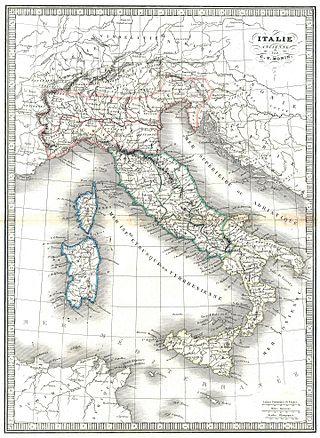
Propaganda Due was a Masonic lodge, founded in 1877, within the tradition of Continental Freemasonry and under the authority of Grand Orient of Italy. Its Masonic charter was withdrawn in 1976, and it was transformed by Worshipful Master Licio Gelli into an international, illegal, clandestine, anti-communist, anti-Soviet, anti-Marxist, and radical right criminal organization and secret society operating in contravention of Article 18 of the Constitution of Italy that banned all such secret associations. Licio Gelli continued to operate the unaffiliated lodge from 1976 to 1984. P2 was implicated in numerous Italian crimes and mysteries, including the collapse of the Holy See-affiliated Banco Ambrosiano, the contract killings of journalist Carmine Pecorelli and mobbed-up bank president Roberto Calvi, and political corruption cases within the nationwide Tangentopoli bribery scandal. P2 came to light through the investigations into the collapse of Michele Sindona's financial empire.
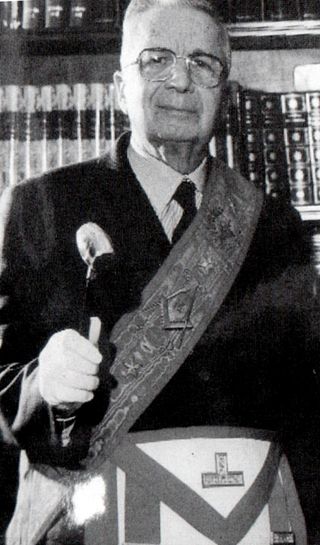
Licio Gelli was an Italian Freemason, criminal and terrorist. A Fascist volunteer in his youth, he is chiefly known for his role in the Banco Ambrosiano scandal. He was revealed in 1981 as being the Venerable Master of the clandestine masonic lodge Propaganda Due (P2).

The Piazza Fontana bombing was a terrorist attack that occurred on 12 December 1969 when a bomb exploded at the headquarters of Banca Nazionale dell'Agricoltura in Piazza Fontana in Milan, Italy, killing 17 people and wounding 88. The same afternoon, another bomb exploded in a bank in Rome, and another was found unexploded in the Tomb of the Unknown Soldier. The attack was carried out by the Third Position, neo-fascist paramilitary terrorist group Ordine Nuovo and possibly certain undetermined collaborators.

The Bologna massacre was a terrorist bombing of the Bologna Centrale railway station in Bologna, Italy, on the morning of 2 August 1980, which killed 85 people and wounded over 200. Several members of the neo-fascist terrorist organization Nuclei Armati Rivoluzionari were sentenced for the bombing, although the group denied involvement.

The Italicus Express massacre was a terrorist bombing in Italy on a train of the public rail network. On 4 August 1974, the bomb attack killed 12 people and wounded 48. Responsibility was claimed by the neo-fascist terrorist organization Ordine Nero.
The Banda della Magliana was an Italian criminal organization based in Rome. It was founded in 1975. Given by the media, the name refers to the original neighborhood, the Magliana, of some of its members.
Nicolò Pollari is a general of the Italian Guardia di Finanza, who was the former head of Italy's national military intelligence agency, or SISMI, from 1 October 2001 until his resignation on 20 November 2006.

The Nuclei Armati Rivoluzionari, abbreviated NAR, was an Italian terrorist neo-fascist militant organization active during the Years of Lead from 1977 to November 1981. It committed over 100 murders in four years, and had planned to assassinate the politicians Francesco Cossiga, Gianfranco Fini and Adolfo Urso. The group maintained close links with the Banda della Magliana, a Rome-based criminal organization, which provided such logistical support as lodging, false papers, weapons, and bombs to the NAR. In November 1981, it was discovered that the NAR hid weapons in the basements of the Health Ministry. The first trial against them sentenced 53 people in May 1985 on charges of terrorist activities.

The Abu Omar Case was the abduction and transfer to Egypt of the Imam of Milan Hassan Mustafa Osama Nasr, also known as Abu Omar. The case was picked by the international media as one of the better-documented cases of extraordinary rendition carried out in a joint operation by the United States' Central Intelligence Agency (CIA) and the Italian Military Intelligence and Security Service (SISMI) in the context of the global war on terrorism declared by the George W. Bush administration.
Guido Salvini is an Italian judge, based in Milan. He issued European arrest warrants in 2005 against approximatively 20 CIA agents accused of having taken part in the abduction of Abu Omar, the Egyptian cleric in Milan in 2003. The case is known in Italy as the Imam Rapito affair. Before that, Guido Salvini was in charge of investigations, since July 1988, concerning Italy's strategy of tension during the 1970s.

In Italy, the phrase Years of Lead refers to a period of political violence and social upheaval that lasted from the late 1960s until the late 1980s, marked by a wave of both far-left and far-right incidents of political terrorism and violent clashes.
Francesco Pazienza is an Italian businessman and former officer of the SISMI, the Italian military intelligence agency. As of April 2007, he had been paroled to the community of Lerici, after serving many years in prison, including a 1993 conviction due to his role in the Banco Ambrosiano scandal, and a 1982 conviction for mishandling state secrets.
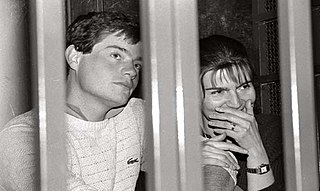
Giuseppe Valerio Fioravanti is an Italian former terrorist and actor, who with Francesca Mambro, was a leading figure in a far-right terrorist group, Nuclei Armati Rivoluzionari. Fioravanti appeared in films and television from a young age, and in his early teens was the most famous child in Italy. He and Mambro were fugitives wanted for terrorist offences by their early twenties, they spent a further period on the run as suspects in the Bologna bombing. Both were captured after gunfights with police, and later found guilty of responsibility for the Bologna train bombing; they were sentenced to ten life terms, plus 250 years. Fioravanti was released from prison in 2009.
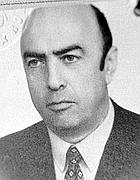
Aldo Semerari was an Italian criminologist, anthropologist and psychiatrist. He was also a noted neo-fascist, who was suspected of complicity in the terror attack that killed 85 people at Bologna railway station in 1980.
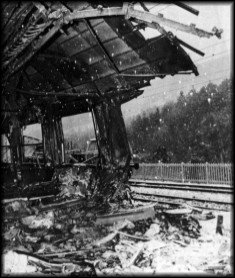
The Train 904 bombing was a terror attack which occurred on 23 December 1984, in the Apennine Base Tunnel. A bomb on the 904 express train from Naples to Milan was detonated, killing 16 and wounding 266. The bombing location was near the location of the Italicus Express bombing ten years previously.

The Red Brigades was a Marxist–Leninist armed terrorist organization, which was operating as a far-left guerilla and terrorist group based in Italy. It was responsible for numerous violent incidents during Italy's Years of Lead, including the kidnapping and murder of Aldo Moro in 1978. A former prime minister of Italy through the Organic centre-left, the murder of Aldo Moro was widely condemned, as was the murder of left-wing trade unionist Guido Rossa in January 1979. Sandro Pertini, the then left-wing president of Italy, said at Rossa's funeral: "It is not the President of the Republic speaking, but comrade Pertini. I knew [the real] red brigades: they fought with me against the fascists, not against democrats. For shame!"

The Ordine Nero was an Italian terrorist fascist group founded in 1974 following the dissolution of the fascist Ordine Nuovo. Between 1974 and 1978, bombings by ON led to a number of woundings and deaths, having orchestrated several deadly bombings and murders including the 1974 Italicus Express Bombing and the 1974 Brescia Bombing.

Terrorism in Italy is related to political and subversive terrorism activities, carried out by various groups and organizations with different and sometimes conflicting methods, motivations and interests. This article is primarily about late 20th-century and early 21st-century terrorism.
In May 1978, Aldo Moro, a Christian Democracy (DC) statesman who advocated for a Historic Compromise with the Italian Communist Party, (PCI), was murdered after 55 days of captivity by the Red Brigades (BR), a far-left terrorist organization. Although the courts established that the BR had acted alone, conspiracy theories related to the Moro case persist. Much of the conspiracy theories allege additional involvement, from the Italian government itself, its secret services being involved with the BR, and the Propaganda Due (P2) to the CIA and Henry Kissinger, and Mossad and the KGB.
References
- ↑ Greggio, Simonetta (20 August 2014). Les nouveaux monstres 1978–2014. ISBN 9782234074491 . Retrieved 20 April 2022.
- ↑ "Former Top Intelligence Official Convicted, Sentenced". Associated Press. 25 July 1985.
- ↑ "Four Convicted Of Mass Murder In Italian Bombing That Killed 85". Associated Press. 11 July 1988.
- ↑ "Officers questioned on Bologna blast". The Guardian. 22 October 1984.
- ↑ "Gli interrogativi del caso Moro", positano news.it. Accessed 3 August 2023.